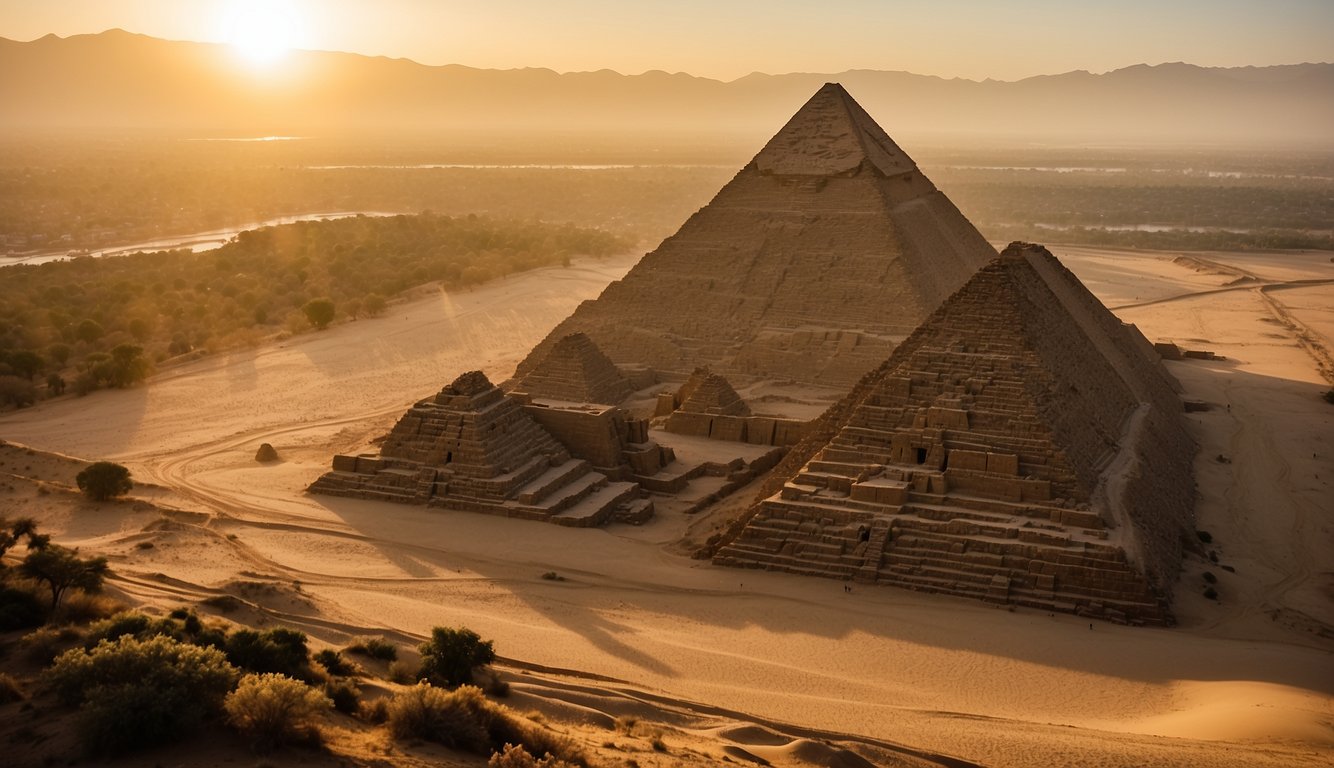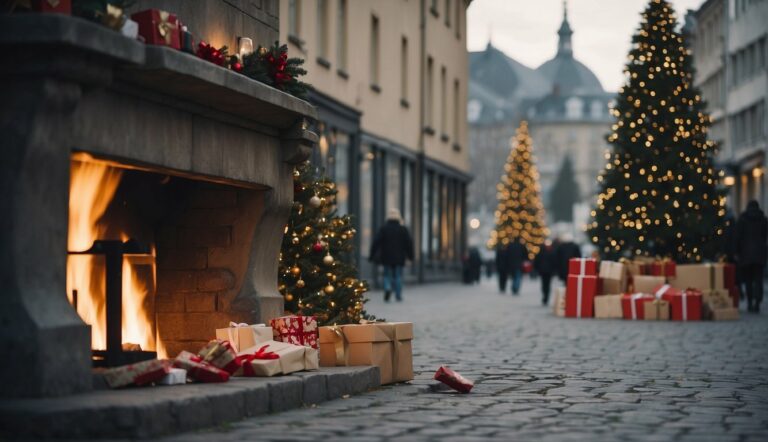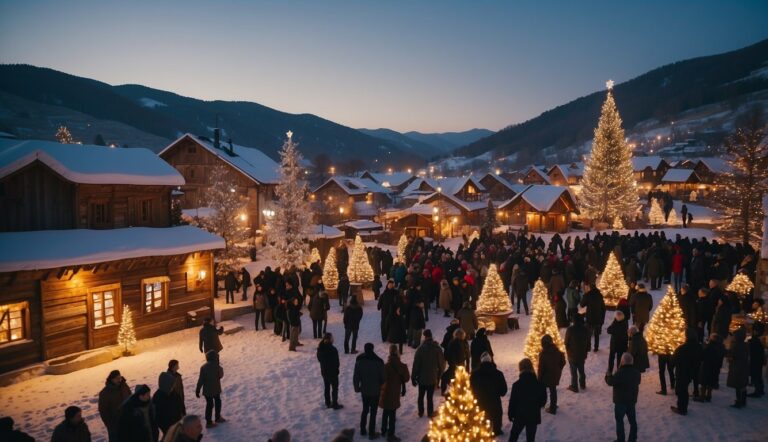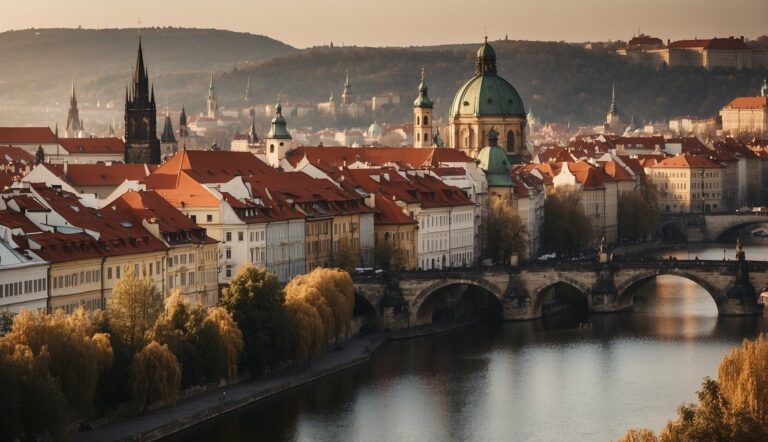Celebrate Christmas in Egypt: A Guide to Festive Traditions and Customs
Celebrating Christmas in Egypt presents a blend of traditions and diverse cultural festivity.
Egyptians, especially the Coptic Christian community, observe this holiday with heightened spiritual significance. They adhere to customs that reflect their strong religious dedication.
The Coptic Christians, adhering to the Coptic Orthodox Church, celebrate Christmas on January 7th rather than December 25th, aligning with the Julian calendar.
This deviation from the Western calendar underscores the uniqueness of the Egyptian Christmas experience.
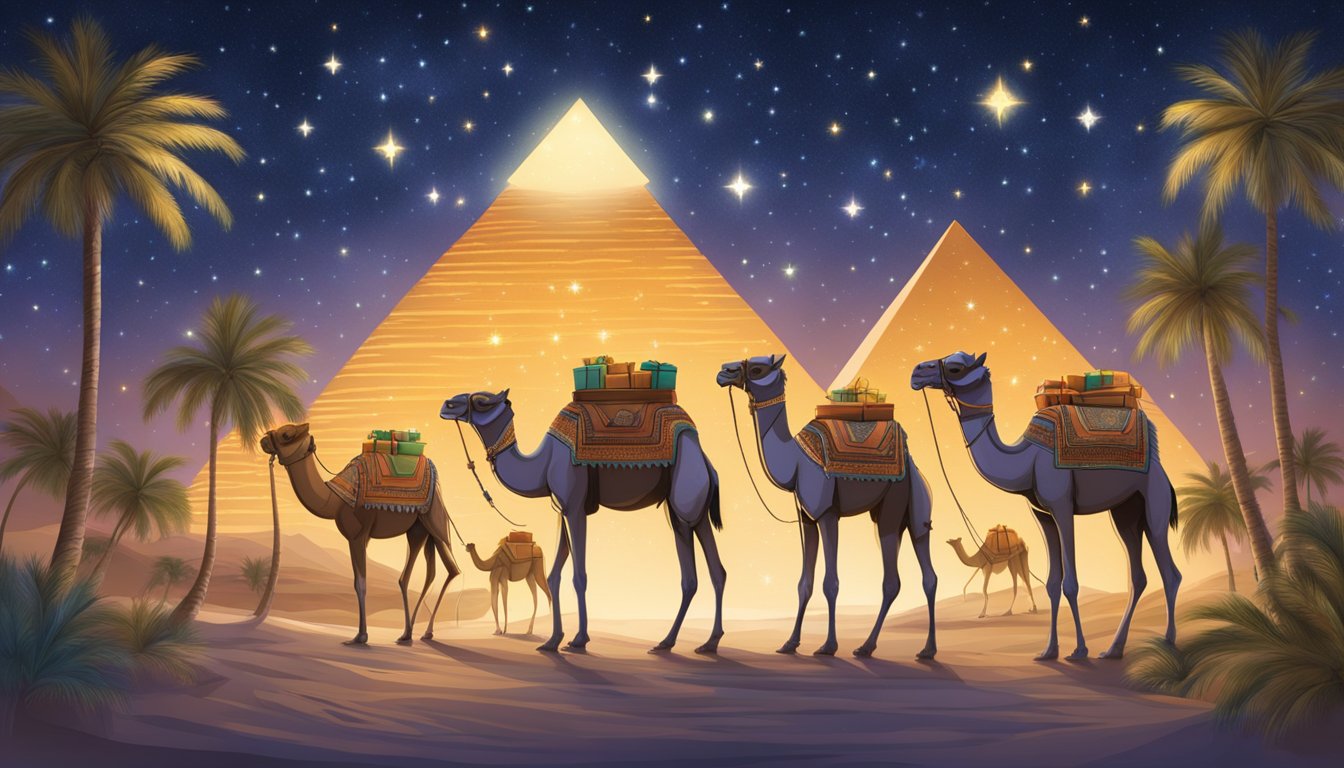
Preparations for the holiday involve a fasting period known as the Nativity Fast, which leads to the Christmas Eve service held on the evening of January 6th.
During this fast, participants abstain from certain foods to display piety and anticipation for the festivities.
However, the season is not only coloured by religious aspects; the secular population also engages in holiday decorations and gift-giving, contributing to the country’s festive atmosphere.
In Egypt, Christmas is as much a time of communal gathering and celebration as it is a spiritual holiday.
Churches, particularly in cities like Cairo and Alexandria, are adorned with lights and ornaments, and worshippers attend special masses culminating in a feast after the fast.
This feast typically includes special dishes such as kahk (a sweet biscuit) and fata (a lamb soup), embodying the tradition’s gastronomic side.
While the hallmark winter cold and snow may not mark Christmas in Egypt, it is a season steeped in cultural richness and spiritual reflection.
Historical Context of Christmas in Egypt
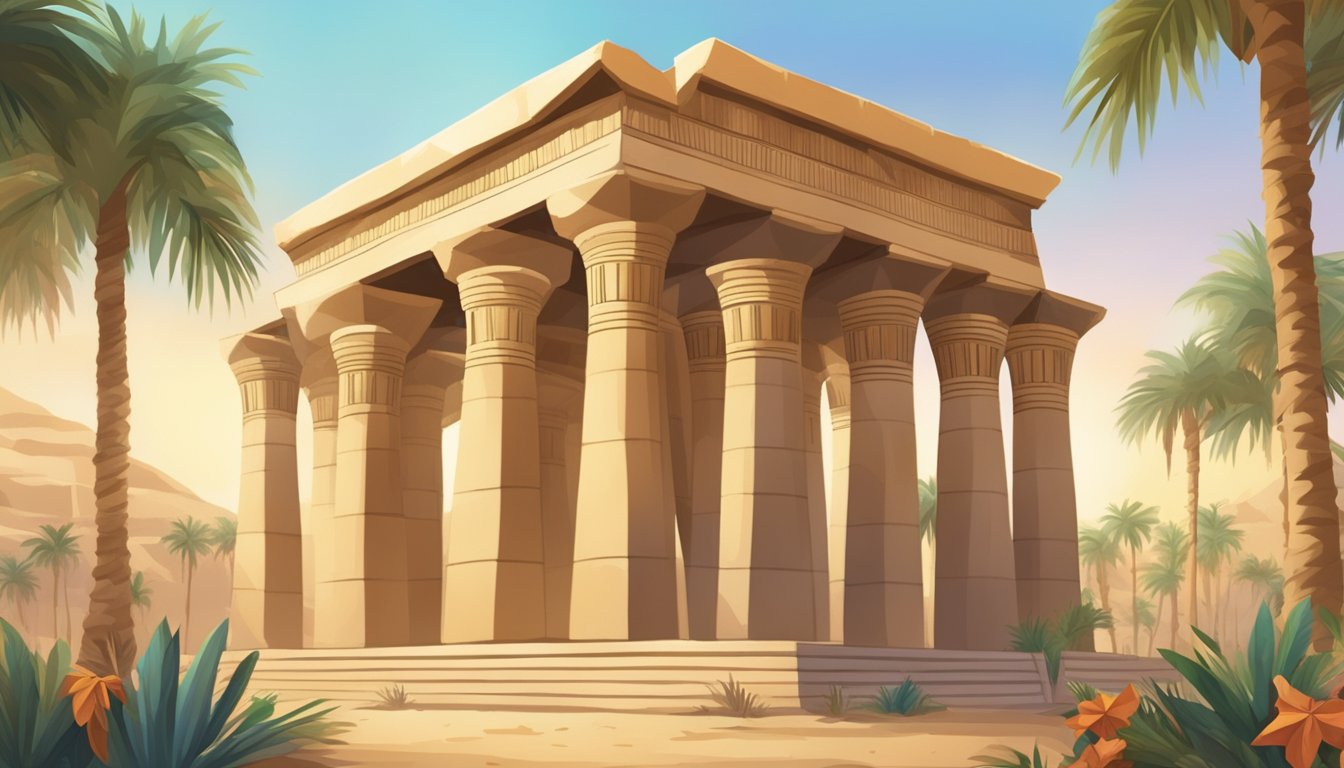
The celebration of Christmas in Egypt carries a rich historical significance embedded in its Christian community, particularly within the Coptic Orthodox Church.
Dating back to the early centuries of Christianity, Egypt’s ancient tradition provides a glimpse into the religious practices that have endured for millennia.
Ancient Roots
Christians have been a part of Egypt since the earliest days of the faith, contributing to the nation’s diverse religious landscape.
As the largest Christian denomination in Egypt, the Coptic Orthodox Church retains a venerable place in the country’s history.
Modern Times:
While historically confined to the Christian community, Christmas became more widespread in Egypt in the early 1990s.
This church celebrates Christmas on January 7th, a date that aligns with the ancient Julian calendar, in contrast to the December 25th date observed by many Western Christian denominations.
Kiahk:
The month leading up to Christmas, known as Kiahk, is marked by a fasting period observed by members of the Coptic Orthodox Church.
Influence from Antiquity
It has been suggested that some elements of Christmas, such as the use of trees, may echo ancient Egyptian practices, like using palm branches during certain festivals. However, such connections are speculative rather than historical facts.
Coptic Christmas Traditions
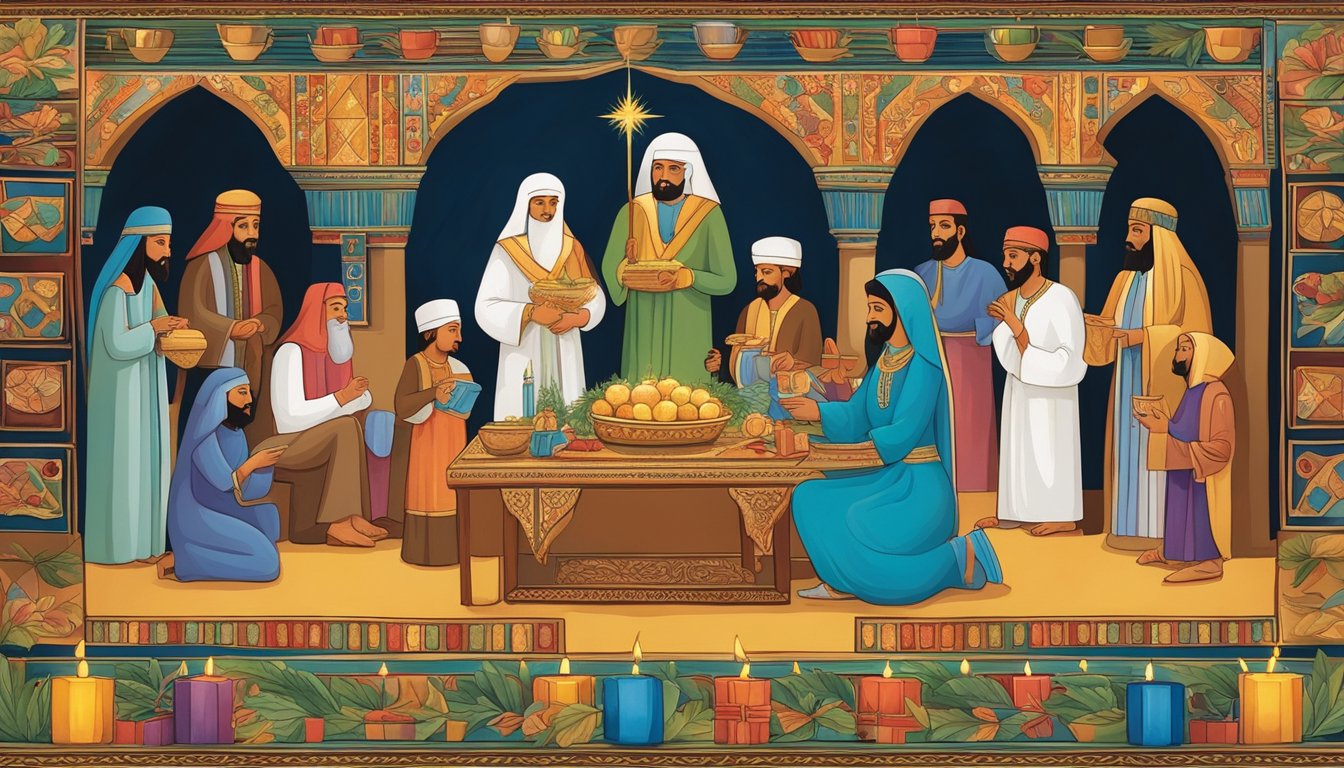
Coptic Christmas in Egypt is rich with traditions that reflect the devout and communal spirit of the Coptic Orthodox community. From the conclusion of a lengthy fast to the gathering for midnight mass, these practices illuminate the unique ways in which the Coptic Christians honour the birth of Jesus Christ.
Coptic Orthodox Church Celebrations
Coptic Orthodox Christians in Egypt celebrate Christmas with great spiritual reverence.
Central to the festivities is the Christmas Eve Mass, which often starts the evening before January 7th and extends into the early hours of the morning.
Worshippers gather in churches to engage in prayers and liturgy, with each expression of faith aimed at honouring the Nativity.
The Significance of January 7th
Based on the Julian calendar, Coptic Christians observe Christmas on January 7th. This differs from the December 25th date recognized by many other Christian denominations.
The shift in date is due to the Coptic Church’s adherence to a different liturgical calendar, which aligns holidays differently than the more widely used Gregorian calendar.
Customs and Practices
The spiritual anticipation builds with the Holy Nativity Fast or Advent Fast, a 43-day fasting and feasting period preceding Christmas.
During Advent, the faithful abstain from meat, poultry, dairy, and often fish, with a focus on prayer and preparation.
On Christmas Day, after the long fast, Coptic Christians feast to celebrate.
Christmas Foods in Egypt
Christmas feasting in Egypt typically includes special dishes like:
Fattah: a mix of meat, rice, and crispy bread seasoned with garlic vinegar and hot sauce.
Kahk: a sweet biscuit dusted with powdered sugar, sometimes filled with nuts or dates.
Rice Pudding: often served as a sweet conclusion to the meal. These foods mark the end of the Coptic fast and bring families together in celebration.
Decorating for the Season
Decorations are a modest yet meaningful part of the Christmas celebration among Coptic Christians.
Homes might display nativity scenes or use simple lights to create a festive atmosphere.
Churches are typically the centre of elaborate decoration, welcoming worshippers with ornaments and displays celebrating the Nativity.
Christmas Gifts and Giving
Gift-giving is less commercial in Coptic Christmas traditions but remains an expression of love and care.
Gifts may be exchanged, often after the Christmas Eve Mass.
Among children, Baba Noël (a figure akin to Santa Claus) is sometimes incorporated into family festivities, representing the spirit of giving.
Christmas Celebrations among Egyptian Christians

In Egypt, Christmas is not just a celebration but a testament to the country’s rich cultural tapestry, where traditions of Coptic Christians shine through their spiritual and communal practices.
Cultural Integration and Unity
Egyptian Christmas celebrations underscore a profound sense of cultural integration and unity among Egyptians.
Although the majority of the population is Muslim, there is substantial respect for the Christian minority during Christmas time.
Coptic Christians, who constitute approximately 15% of the population, profoundly experience this sense of unity during the festive period.
Families and friends, regardless of religious affiliations, come together to commemorate the spirit of Christmas, reinforcing bonds across different faiths in Egyptian society.
Public and Private Observances
The private observances of Christmas among Coptic Christians often involve prayer and worship, with special masses held in churches on Christmas Eve.
Christmas Day celebrated on January 7th rather than December 25th, culminates the 43-day Advent fast, during which followers partake in vegan meals and abstain from dairy and meat.
In their homes, breaking the fast leads to a festive meal shared with families and friends, a moment of joy after a period of spiritual reflection.
Although Christmas is not a national public holiday in Egypt, public recognition is evident in major cities where festive decorations and events are held.
Christmas is an opportunity for Egyptians of all faiths to witness the religious and cultural practices of the nation’s Christian community, adding to the diverse mosaic of Egyptian society.
Christmas in Urban Centers

Urban centres in Egypt, like Cairo, Alexandria, and Luxor, transform during Christmas. Streets gleam with festive lights, and markets bustle with holiday activity as Egyptian Christians, and visitors share in the yuletide spirit.
Cairo’s Christmas Vibes
In Cairo, Christmas lights and decorations create a sparkling spectacle against the backdrop of the city’s iconic landmarks.
The streets of central Cairo, particularly in Christian-majority neighbourhoods, radiate with the season’s joy, drawing both locals and tourists to experience the festive mood.
Christmas Atmosphere in Alexandria
As Egypt’s second-largest city, Alexandria’s Mediterranean charm is enhanced by Christmas festivities.
Streets near landmarks such as the Bibliotheca Alexandrina are adorned with festive decorations, while local markets and bazaars offer a plethora of Christmas goodies, from ornaments to traditional sweets.
Luxor’s Festive Celebrations
Luxor, known for its ancient temples and rich history, joins in the Christmas celebrations with its unique blend of tradition and modernity.
The city’s streets are lined with holiday lights, and the markets become a hub for Christmas shopping. They offer traditional Egyptian crafts that make perfect festive gifts.
Christmas Markets and Bazaars
Throughout the urban centres, Christmas markets and bazaars are a staple.
They are places where one can find everything from handcrafted ornaments to seasonal foods.
The aroma of festive treats fills the air as shoppers seek out the perfect gifts among the colourful stalls, which are a testament to Egypt’s rich cultural tapestry.
Social Aspects of Christmas in Egypt

In Egypt, Christmas is a religious festival and a social event that transcends religious lines and promotes unity among Egyptians.
Interfaith Harmony and Outreach
Christmas in Egypt serves as a beacon of interfaith harmony, particularly between the majority Muslims and minority Christians, who make up approximately 15% of the population.
Muslims often greet Christian neighbours during the holiday, even attending Christmas services in solidarity.
This has become an aspect of the culture that underscores the broader unity within the Egyptian community.
Christmas and Social Welfare
During Christmas, there’s a strong emphasis on supporting the poor.
Christians and Muslims participate in charitable activities, reflecting a common cultural value.
Churches and mosques alike tend to organize events to help the less fortunate, offering meals and aid as a manifestation of the Christmas spirit.
Charity during this time is considered an integral part of the celebration, revealing the compassionate facet of Egyptian society.
Christmas in Egypt Today
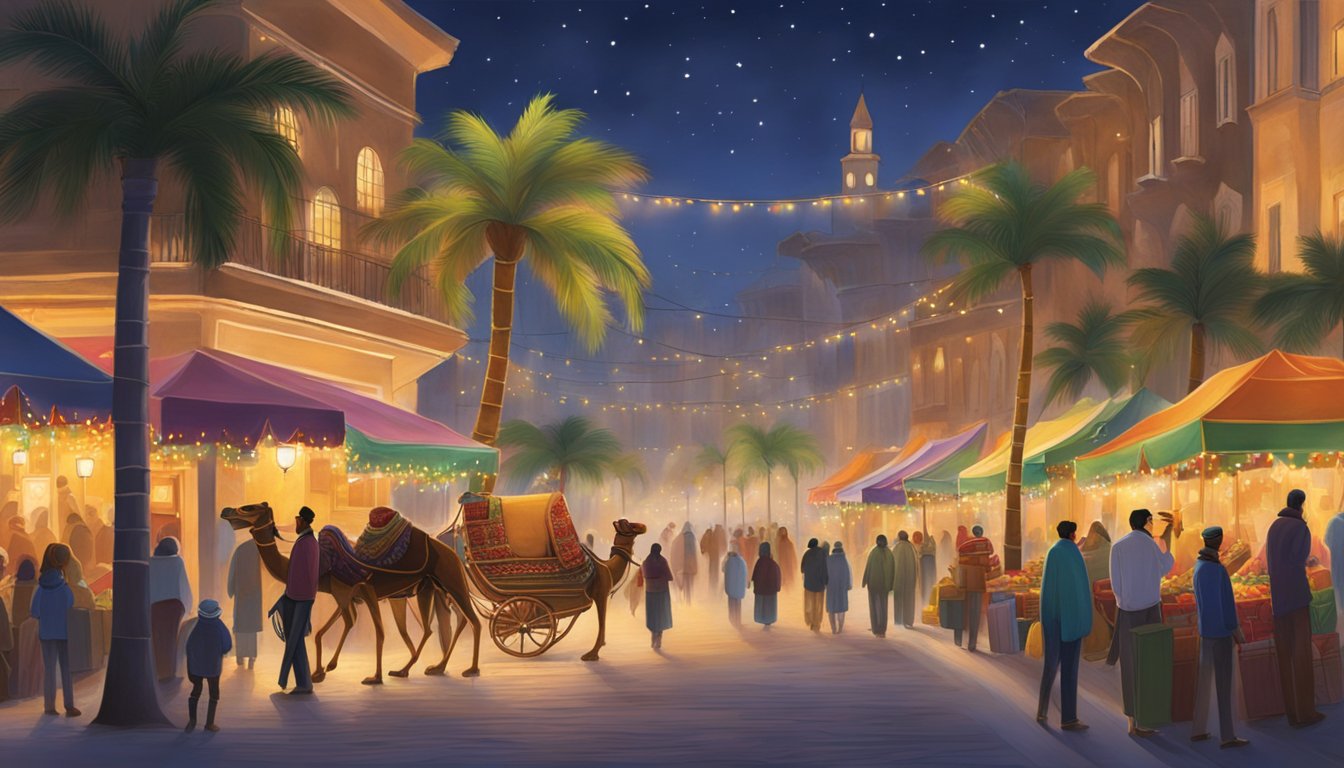
In contemporary Egypt, the Christmas season is marked by a blend of devotion and festivity observed predominantly by the Christian community, constituting roughly 15% of the population.
Most Egyptian Christians follow the Coptic Orthodox Church calendar, celebrating Christmas on January 7th.
A hallmark of modern practices involves a 43-day fasting period leading up to the holiday, known as “The Holy Nativity Fast.”
During this time, adherents adhere to a vegan diet, abstaining from all animal products.
Festivities begin on Christmas Eve with a liturgy in churches that may extend into the early morning hours. This special service includes prayers and hymns reflecting both reverence and celebration.
Coptic Orthodox Churches often witness large gatherings.
Christmas Mass is celebrated around midnight.
Current Practices:
Midnight Mass is a pivotal religious service attended by families.
The strict fasting concludes with a festive meal after the mass.
In present-day Egypt’s social landscape, Christmas transcends religion, creating a time of unity across different faiths:
Decorations: Streets and homes showcase colourful adornments.
Community: Both Christian and Muslim Egyptians share in the festive spirit.
Due to various contemporary challenges, the current practices preserve age-old traditions while reflecting modern contexts, such as scaled celebrations within the largest Coptic cathedral. Despite these, the essence of Christmas in Egypt today remains a vibrant and integral part of the nation’s cultural tapestry.
Frequently Asked Questions
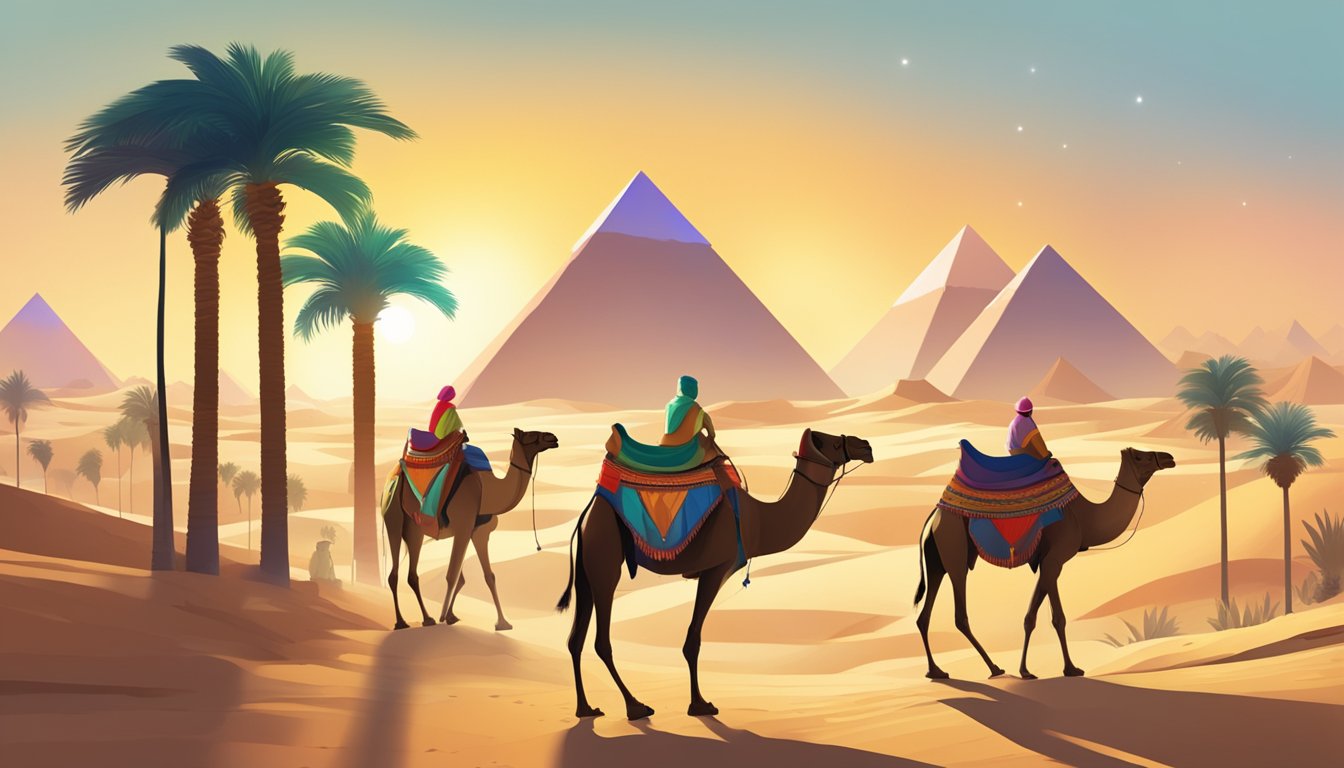
What are the traditional Christmas foods in Egypt?
Egyptians break their 43-day fast with a feast, which typically includes ‘Fata,’ a dish made from rice, garlic, boiled lamb meat, and bread soaked in broth. Sweet biscuits known as ‘Kahk’ are also a festive treat.
How do Egyptians typically celebrate Christmas?
The celebration of Christmas in Egypt is a blend of religious devotion and social joy.
Families attend the Coptic Christmas Eve mass that can last until the early hours of the morning. Afterwards, they gather for a meal to break the fast, exchanging visits and greetings with loved ones.
What is the history behind Christmas celebrations in Egypt?
Christmas celebrations in Egypt have their roots in the Coptic Orthodox Church, which is one of the oldest Christian denominations in the world.
Egyptian Christians observed the birth of Jesus on January 7th, according to the Julian calendar.
Who is the Egyptian equivalent of Santa Claus?
The Egyptian equivalent of Santa Claus is Baba Noël, meaning Father Christmas. During the Christmas season, he is believed to visit homes and give gifts to children.
Can you explain why Christmas in Egypt is celebrated on January 7th?
In Egypt, Christmas is celebrated on January 7th to align with the Julian calendar used by the Coptic Orthodox Church, which differs from the Gregorian calendar, which sets Christmas on December 25th.
What are the unique Christmas traditions in Egypt?
The 43-day fast preceding the holiday is unique to Egyptian Christmas traditions, during which only vegan items are consumed.
On the night of January 6th, families attend the Christmas Eve mass.
Public celebrations and decorations are becoming more visible in the country, reflecting a blend of Coptic and Western festivities.

